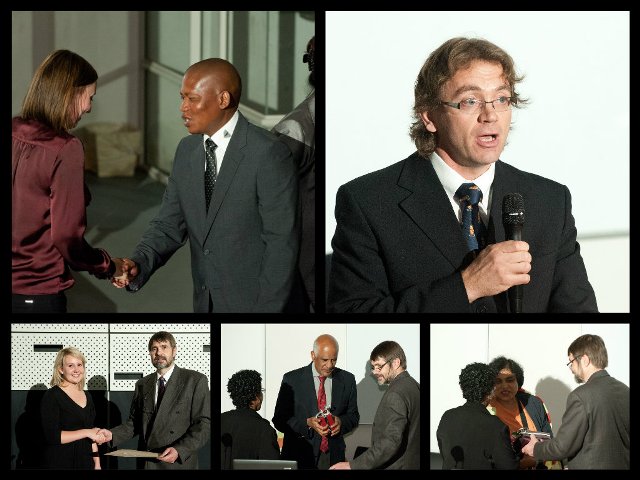After a warm welcoming and introduction by the Dean of the Faculty of Law, Prof André Boraine, Justice Yacoob addressed the audience of achievers, donors and staff members of the Faculty on the constitutional order, which he stressed was vibrant, responsive and dynamic. He continued by saying that a dynamic constitutional order was necessary to ensure a dynamic Constitution. He also said that the Constitution had been enacted not merely to give effect to a settlement between opposing forces in the struggle for democracy, not merely to regulate government for its own sake, not merely to define the powers of governmental institutions, but for the benefit of all the people of South Africa. He further stressed that more particularly the Constitution was there to ensure that people who were vulnerable and marginalised as a result of poverty, race, creed, gender or for other reasons had to be protected and their quality of life improved.
Justice Yacoob continued by saying that there was a tendency of many to believe that the passing of the Constitution has already resulted in the achievement of the rights enshrined in it. He said that this regrettably was not the case, as it was common knowledge that inequality, suffering, poverty, inhumanity and indignity remained the order of the day for many millions of people in South Africa. He was adamant that the Constitution merely created a framework or launching pad for the achievement of an effective society as was described in the Bill of Rights. He said that it thus placed an undeniable obligation on all the people of South Africa, including the young lawyers that were present at the occasion, to leave no stone unturned in the process of achieving such result, as this was essential for a dynamic Constitution. Unless this happens, the Constitution will remain static and of no value. Although the Constitution introduced democracy it also merely created the conditions for establishing a democracy and made it possible for South Africans and lawyers to work harder at it, promoting it and developing it.
He further said that a dynamic Constitution requires the participation of civil society and should never be the preserve of constitutional lawyers only. He expressed concern that the values the Bill of Rights represented and reflected would expire unless the majority of the people in South Africa knew, understood, internalised, felt and actually lived them. Justice Yacoob said that all South Africans had a duty to ensure that they lived according to and do what the Constitution required. He said that everyone, including a tertiary institution such as the University of Pretoria, had an obligation to do what they could to ensure that the Constitution and the Bill of Rights in particular were known and understood by the people of South Africa.
He continued by saying that he could not comprehend why the Bill of Rights was not as yet a significant part of the orientation programme at every university in our country for all new students, irrespective of whether they were studying law or not. He said that he has made this proposal at three universities to date. With the hope that he was wrong, he said he was almost sure that none of them has accepted his request to do so. He went on by challenging the Faculty of Law and the University of Pretoria to set a trend in this regard, saying that the Bill of Rights did not exceed ten pages and that it could not be overly expensive or particularly burdensome to make a copy available to every new student at every institution of learning.
He concluded by wishing the achievers successful careers as lawyers, doing everything in their power to promote and live the Bill of Rights and the Constitution when practising law.








Get Social With Us
Download the UP Mobile App